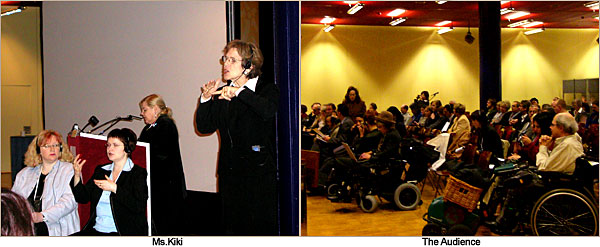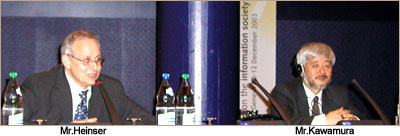HIGHLIGHT
-Global Forum on disability in the information Society-
(12 December 2003)
Global Forum on disability in the information Society (Program)

The Global Forum on disability was successfully conducted from 9:30 to 18:30 on 12 December 2003. The programm was available in the following formats considering people with different disabilities:Ink print, Large print, Braille, CD-ROM and on the web. Sign language was available during the forum.
There are about 200 people including persons with various disabilities who participated in this forum.
This forum was divided into four sessions: opening session, best practices showcase, ICT-design and development for all and closing session.
It began with the welcome speech by Mr. Bernard. Heinser, Director of the Swiss Library for the Blind on behalf of organizing committee of this forum.. Thanks to his organization CD-ROM in DAISY format containing the resource materials of the WSIS such as Draft Declaration of Principles and Draft Action Plans,was distributed to all of WSIS participants.
Ms. Kiki Nordstrom, President of the World Blind Union as well as Chair of the International Disability Alliance who made remarks on behalf of civil society at the opening ceremony made a keynote speech.
Most of the speakers are persons with disabilities and it was meaningful to hear voices from those people about ICT in the information Society. (The profile and abstract of each speaker can be read at 031215_3wsis.html

At the closing session "Geneva Declaration on Accessible Information Society "was adopted by the Global Forum on Disability after the discussion chaired by Mr. Hiroshi Kawamura who acted as a focal point of Disability Family Groups of the Civil Society Bureau of the WSIS. The text is following.
Geneva Declaration on Accessible Information Society
Recognizing that the information society will determine the direction and development of human civilization throughout the 21st century and beyond;
Stating, with firm belief in the Information Society, that access to information and communications is a fundamental human right;
Bearing in mind that persons with disabilities, especially those in developing countries, are the poorest of the poor, leading to isolation from information and communication and exclusion from the benefits of new and emerging ICTs;
Realizing the importance of existing tools such as Braille, sign languages, tactile sign languages, easy-to-read materials in local languages including those without written scripts, symbol systems and other assistive devices as vital for persons with disabilities to meet their information and communication needs,
Noting with concern that several key issues which can help determine the inclusiveness and sustainability of the information society, such as open source software and open hardware development, are not receiving enough commitment and support from governments and private sectors;
Noting with appreciation that the needs and requirements of persons with disabilities are beginning to be recognized by governments and civil society as shown in the WSIS documents;
But, noting with regret, that the summit in Geneva has not yet sufficiently taken the needs of persons with disabilities into account as demonstrated by the absence of timely summit information in alternate format, facilities such as Braille printers, synthetic speech, sign language interpreters and the absence of content that adequately addresses issues of more than 600 million persons with disabilities.
Realizing the importance of active involvement of persons with disabilities as consumers, partners, and contributors throughout the process of ICT development which will help shape the inclusive information society;
We, participants of the Global forum on Disability in the Information Society, held during the World Summit on the Information Society declare in solidarity that:
- Persons with disabilities have the right to full participation in all aspects of the information society, free from all types of barrier, prejudice and discrimination;
- Legislation and policies at all levels of government must ensure the fundamental human right of access to information, communication and ICTs for persons with disabilities in formats that meets their needs and their rights;
- As content of information, communications and ICTs play a crucial role in shaping the information society, Governments, Businesses, and Civil Society must make them accessible to persons with all types of disabilities, using Universal Design and assistive and augmentative technologies;
- Access to information and knowledge through ICTs must be available at the same time and at no additional cost for those with disabilities as compared to those without disabilities;
- Any social norms, rules, legislation/policies including intellectual property rights protection and copyright laws or Digital Rights Management (DRM) system must not compromise the fundamental right of access to information and communications for persons with disabilities;
- The information society should adopt and follow information, communications and ICT standards that are universal, open, non-proprietary, platform independent with a proven track record of accessibility for persons with disabilities;
- Consistent with the millennium goals for poverty alleviation, initiatives must be undertaken that result in the inclusion of people lacking resources in the information society;
- Assistive technologies, documentation, training, and technical support should be made available in easy to understand local languages for persons with disabilities;
- The information society must take into account many barriers associated with age, gender, indigenous peoples, geographic isolation, economic barriers, lack of access to education and social prejudice associated with disability;
- In preparation for the second WSIS in Tunis, the organizers should include persons with disabilities and their organizations in the preparation.
- Programs and content should reflect the needs of more than 600 million persons with disabilities in the world, and that deliberation should provide for communication needs of this population such as sign languages, Braille, alternate formats, etc.
- In all WSIS processes from Geneva through Tunis, facilities should be made available for the full participation of persons with disabilities, including resource centres with materials in alternate formats, computers with accessible input and output devices such as synthetic speech capacity, accessible keyboards, Braille printers, sign language interpreters and other resources to address and eliminate the variety of communication barriers.
